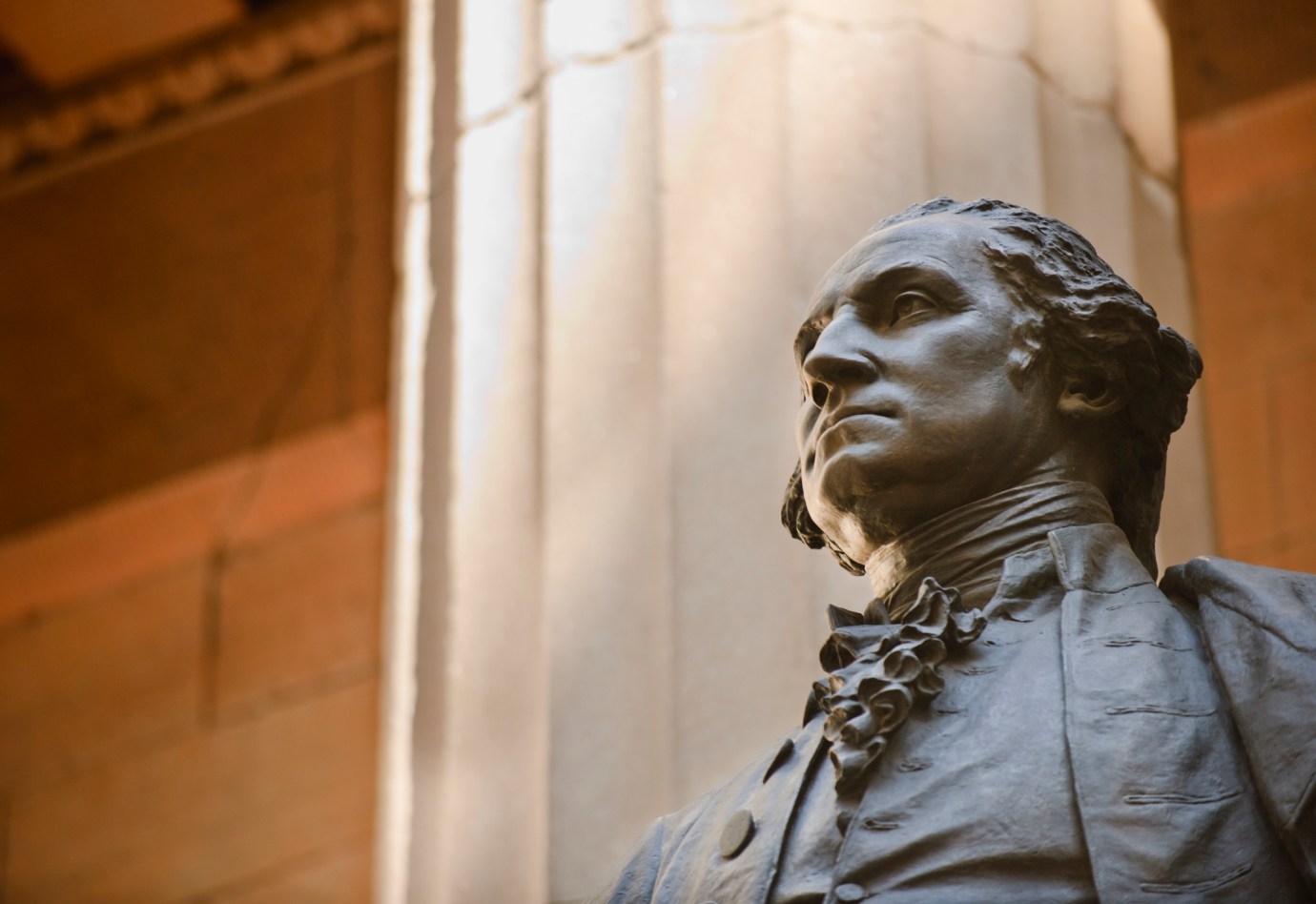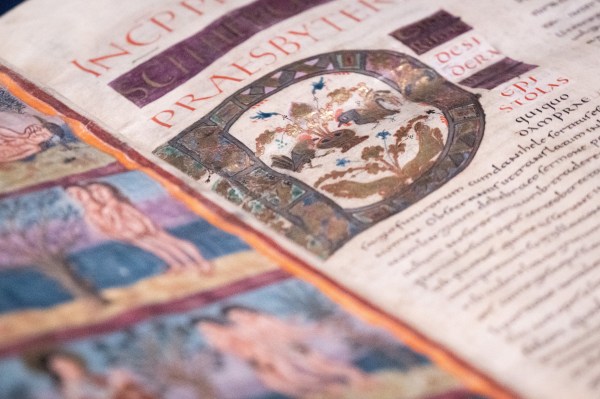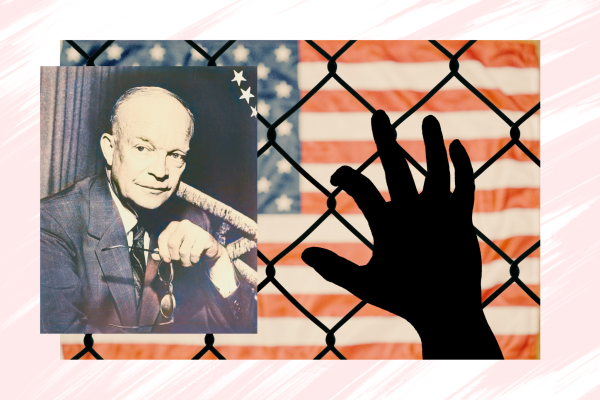Happy Presidents’ Day! As if we needed another reason to look forward to summer—Taco Bell and Salt & Straw Ice Cream announced earlier this month that they are partnering to revive the discontinued Choco Taco. We’ll see you at the ice cream trucks!
Quick Hits: Today’s Top Stories
- Israeli war cabinet member Benny Gantz said on Sunday that the Israeli Defense Forces (IDF) would launch a ground offensive into the city of Rafah if Hamas does not return the remaining hostages by the holy month of Ramadan, which begins on March 10. The Israeli government has not officially laid out a timeline for an expansion of the war into Rafah. The U.S. ambassador to the U.N. on Saturday threatened to veto an Algerian-proposed ceasefire agreement if it were to come up for a vote at the U.N., arguing instead that negotiations led by the U.S., Qatar, and Egypt would better achieve a sustained ceasefire and hostage release.
- Ukrainian President Volodymyr Zelensky signed long-term security pacts with France and Germany on Friday, following up on a similar agreement made with the United Kingdom in January. The bilateral pacts pledge French and German support for the war-torn country, largely via military aid—both during the conflict with Russia and in the event Russia ever attacks again during the 10 years covered by the agreements. German Prime Minister Olaf Scholz also announced roughly 1 billion euros in materiel and ammunition for Ukraine, while France promised some 3 billion euros in military support this year. Zelensky said the agreements also signaled the inevitability of Ukrainian entry into NATO and the European Union in the coming years. On Saturday, Zelensky attended the Munich Security Conference, where he met with leaders, including Vice President Kamala Harris, in hopes of securing more support for the war.
- Prison authorities claimed Saturday that Alexei Navalny, the late Russian opposition leader, died of “sudden death syndrome” in the Siberian prison camp where he was serving a three-decade sentence, according to Navalny’s spokespeople. Officials told Navalny’s mother that his body would not be handed over until an investigation had been completed. On Friday, President Joe Biden pointed the finger at Russian President Vladimir Putin. “Make no mistake, Putin is responsible for Navalny’s death,” Biden told reporters. “We don’t know exactly what happened, but there is no doubt that the death of Navalny was a consequence of something that Putin and his thugs did.” On Sunday, Republican Sen. Lindsey Graham of South Carolina—who voted against aid to Ukraine last week—said he would move with bipartisan support to label Russia a “state sponsor of terror,” a designation that comes with significant sanctions.
- Hungarian Prime Minister Viktor Orbán said Saturday during his state of the nation speech that his parliament would be ready to ratify Sweden’s NATO accession in the spring, eliminating the final barrier to Swedish membership in the defensive alliance after the Turkish parliament greenlit the move in January. Orbán said he and his Swedish counterpart, Ulf Kristersson, have moved to “rebuild trust”; the Hungarian leader has previously suggested the delay in ratifying the Nordic country’s membership had to do with Stockholm’s criticisms of Budapest’s democratic backsliding.
- Former President Donald Trump and his businesses received a $355 million penalty on Friday as part of a New York civil fraud case related to Trump’s falsifying records and inflating the value of his assets. Justice Arthur Engoron ordered Trump to pay the fine and barred the former president from leading a New York-based company for three years; Eric Trump and Donald Trump Jr. were also hit with a similar prohibition for two years. Trump—who decried the decision as a “Complete and Total SHAM”—is likely to appeal the ruling.
- Two juveniles were charged on Thursday in connection with last week’s shooting at the Kansas City Chiefs’ Super Bowl Parade that left one person dead and injured 22 others. Local authorities did not identify the juveniles or release their ages, but officials have said the shooting appears to have stemmed from a personal dispute—not terrorism or extremism. The pair—currently detained—was charged by the Office of the Juvenile Officer, but it remains to be seen if they will be prosecuted as adults.
- Sen. Joe Manchin announced on Friday that he will not run for president in 2024. The West Virginia Democrat had publicly considered mounting a bid, embarking on a national listening tour that led political observers to speculate he could be part of a No Labels unity ticket. “I will not be seeking a third-party run,” Manchin said in a speech at West Virginia University. “I am not going to be a deal-breaker, if you will, a spoiler.”
- True the Vote, an activist group that claimed that ballot stuffing in Georgia rigged the 2020 election and the January 2021 senate runoff, admitted in court filings released last week that it lacked evidence to substantiate its allegations. The group—highlighted in Dinesh D’souza’s 2000 Mules documentary—filed complaints with the state of Georgia claiming it had evidence of a “coordinated effort” to stuff ballots, and last year, a district court judge ordered True the Vote to produce evidence of their claims. In December filings released on Wednesday, the group said it lacked evidence of ballot stuffing, contact information for alleged whistleblowers who knew of the alleged scheme, or any transcripts, recordings, statements, or testimony from supposed whistleblowers or witnesses.
A Message from George Washington

As we celebrate Presidents’ Day, please take a moment today to read then-Gen. George Washington’s Newburgh address. Delivered on March 15, 1783, to officers under his command, Washington confronted a conspiracy in which some soldiers were planning a mutiny in response to Congress’ delay in delivering pay and provisions. While Washington had sympathy for the soldiers’ frustrations, he sharply rebuked anyone “who wickedly attempts to open the floodgates of civil discord and deluge our rising empire in blood.” Luckily for us, such people no longer exist today!
By an anonymous summons, an attempt has been made to convene you together—how inconsistent with the rules of propriety! how unmilitary! and how subversive of all order and discipline—let the good sense of the Army decide.
In the moment of this summons, another anonymous production was sent into circulation; addressed more to the feelings [and] passions, than to the reason [and] judgment of the Army. The Author of the piece, is entitled to much credit for the goodness of his Pen: and I could wish he had as much credit for the rectitude of his Heart—for, as Men see thro’ different Optics, and are induced by the reflecting faculties of the Mind, to use different means to attain the same end; the Author of the Address, should have had more charity, than to mark for Suspicion, the Man who should recommend Moderation and longer forbearance—or, in other words, who should not think as he thinks, and act as he advises. But he had another plan in view, in which candor and liberality of Sentiment, regard to justice, and love of Country, have no part; and he was right, to insinuate the darkest suspicion, to effect the blackest designs.
That the Address is drawn with great art, and is designed to answer the most insidious purposes. That it is calculated to impress the Mind, with an idea of premeditated injustice in the Sovereign power of the United States, and rouse all those resentments which must unavoidably flow from such a belief. That the secret Mover of this Scheme (whoever he may be) intended to take advantage of the passions, while they were warmed by the recollection of past distresses, without giving time for cool, deliberative thinking, [and] that composure of Mind which is so necessary to give dignity [and] stability to measures, is rendered too obvious, by the mode of conducting the business, to need other proof than a reference to the proceeding.
Thus much, Gentlemen, I have thought it incumbent on me to observe to you, to shew upon what principles I opposed the irregular and hasty meeting which was proposed to have been held on Tuesday last: and not because I wanted a disposition to give you every opportunity, consistent with your own honor, and the dignity of the Army, to make known your grievances. If my conduct heretofore, has not evinced to you, that I have been a faithful friend to the Army; my declaration of it at this time wd be equally unavailing [and] improper—But as I was among the first who embarked in the cause of our common Country—As I have never left your side one moment, but when called from you, on public duty—As I have been the constant companion [and] witness of your Distresses, and not among the last to feel, [and] acknowledge your Merits—As I have ever considered my own Military reputation as inseperably connected with that of the Army—As my Heart has ever expanded wth joy, when I have heard its praises—and my indignation has arisen, when the Mouth of detraction has been opened against it—it can scarcely be supposed, at this late stage of the War, that I am indifferent to its interests.
But—how are they to be promoted? The way is plain, says the anonymous Addresser—If War continues, remove into the unsettled Country—there establish yourselves, and leave an ungrateful Country to defend itself—But who are they to defend? Our Wives, our Children, our Farms and other property which we leave behind us. or—in this state of hostile seperation, are we to take the two first (the latter cannot be removed) to perish in a Wilderness, with hunger cold [and] nakedness? If Peace takes place, never sheath your Sword says he untill you have obtained full and ample Justice—this dreadful alternative, of either deserting our Country in the extremest hour of her distress, or turning our Army against it, (which is the apparent object, unless Congress can be compelled into an instant compliance) has something so shocking in it, that humanity revolts at the idea. My God! What can this Writer have in view, by recommending such measures? Can he be a friend to the Army? Can he be a friend to this Country? Rather, is he not an insidious Foe? Some Emissary, perhaps, from New York, plotting the ruin of both, by sowing the seeds of discord [and] seperation between the Civil [and] Military powers of the Continent? And what a Compliment does he pay to our understandings, when he recommends measures in either alternative, impracticable in their nature?
But here, Gentlemen, I will drop the curtain; because it wd be as imprudent in me to assign my reasons for this opinion, as it would be insulting to your conception, to suppose you stood in need of them. A moments reflection will convince every dispassionate Mind of the physical impossibility of carrying either proposal into execution.
There might, Gentlemen, be an impropriety in my taking notice, in this Address to you, of an anonymous production—but the manner in which that performance has been introduced to the Army—the effect it was intended to have, together with some other circumstances, will amply justify my observations on the tendency of that Writing. With respect to the advice given by the Author—to suspect the Man, who shall recommend moderate measures and longer forbearance—I spurn it—as every Man, who regards that liberty, [and] reveres that Justice for which we contend, undoubtedly must—for if Men are to be precluded from offering their sentiments on a matter, which may involve the most serious and alarming consequences, that can invite the consideration of Mankind; reason is of no use to us—the freedom of Speech may be taken away—and, dumb [and] silent we may be led, like sheep, to the Slaughter.
I cannot, in justice to my own belief, [and] what I have great reason to conceive is the intention of Congress, conclude this Address, without giving it as my decided opinion; that that Honble Body, entertain exalted sentiments of the Services of the Army; and, from a full conviction of its Merits [and] sufferings, will do it compleat Justice: That their endeavors, to discover [and] establish funds for this purpose, have been unwearied, and will not cease, till they have succeeded, I have not a doubt. But, like all other large Bodies, where there is a variety of different Interests to reconcile, their deliberations are slow. Why then should we distrust them? and, in consequence of that distrust, adopt measures, which may cast a shade over that glory which, has been so justly acquired; and tarnish the reputation of an Army which is celebrated thro’ all Europe, for its fortitude and Patriotism? and for what is this done? to bring the object we seek for nearer? No! most certainly, in my opinion, it will cast it at a greater distance.
For myself (and I take no merit in giving the assurance, being induced to it from principles of gratitude, veracity [and] justice)—a grateful sence of the confidence you have ever placed in me—a recollection of the Chearful assistance, [and] prompt obedience I have experienced from you, under every vicisitude of Fortune, and the sincere affection I feel for an Army, I have so long had the honor to Command, will oblige me to declare, in this public [and] solemn manner, that, in the attainment of compleat justice for all your toils [and] dangers, and in the gratification of every wish, so far as may be done consistently with the great duty I owe my Country, and those powers we are bound to respect, you may freely command my services to the utmost of my abilities.
While I give you these assurances, and pledge my self in the most unequivocal manner, to exert whatever ability I am possesed of, in your favor—let me entreat you, Gentlemen, on your part, not to take any measures, which, viewed in the calm light of reason, will lessen the dignity, [and] sully the glory you have hitherto maintained—let me request you to rely on the plighted faith of your Country, and place a full confidence in the purity of the intentions of Congress; that, previous to your dissolution as an Army they will cause all your Accts to be fairly liquidated, as directed in their resolutions, which were published to you two days ago—and that they will adopt the most effectual measures in their power, to render ample justice to you, for your faithful and meritorious Services. And let me conjure you, in the name of our common Country—as you value your own sacred honor—as you respect the rights of humanity, [and] as you regard the Military [and] national character of America, to express your utmost horror [and] detestation of the Man who wishes, under any specious pretences, to overturn the liberties of our Country, [and] who wickedly attempts to open the flood Gates of Civil discord, [and] deluge our rising Empire in Blood.
By thus determining—[and] thus acting, you will pursue the plain [and] direct Road to the attainment of your wishes. You will defeat the insidious designs of our Enemies, who are compelled to resort from open force to secret Artifice. You will give one more distinguished proof of unexampled patriotism [and] patient virtue, rising superior to the pressure of the most complicated sufferings; And you will, by the dignity of your Conduct, afford occasion for Posterity to say, when speaking of the glorious example you have exhibited to man kind, “had this day been wanting, the World had never seen the last stage of perfection to which human nature is capable of attaining.”
Worth Your Time
- In a piece for the Hedgehog Review, Alan Jacobs argued that exhortations to reject pessimism and vitriol in our public life and maintain a commitment to free thought and expression miss the foundational attractiveness of hatred and the necessity of educating the passions to forgo such hatred. “Many Americans, as far as I can tell, don’t want to shape their views in accordance with the data; many Americans, again as far as I can tell, don’t want to create an environment in which a broad range of perspectives are freely articulated and peacefully debated,” Jacobs wrote. “They don’t want to be hopeful about the possibilities of America. Nor do they want academic freedom in our universities. What many people want, what they earnestly and passionately desire, is to hate their enemies.” Jacobs doesn’t think, however, that this tendency presages a surge in political violence or civil war. “‘We learn to curb our will and keep our overt actions within the bounds of humanity, long before we can subdue our sentiments and imaginations to the same mild tone,’” he wrote, quoting William Hazlitt’s On the Pleasure of Hating. “‘We give up the external demonstration, the brute violence, but cannot part with the essence or principle of hostility.’ We’re content to condemn and mock our enemies on social media and demand that they be fired from their jobs and banished from polite society. Thus ‘the spirit of malevolence survives the practical exertion of it.’”
Presented Without Comment
ABC News: [Nikki] Haley Won’t Say if She’d Still Back Trump as GOP Nominee: ‘I Am Running Against Him for a Reason’
Also Presented Without Comment
Associated Press: Trump Hawks $399 Branded Shoes at ‘Sneaker Con,’ a Day After a $355 Million Ruling Against Him
Also Also Presented Without Comment
Politico: [Democratic Rep. Dean] Phillips Announces Campaign Layoffs, Says He Will Remain in Race
Toeing the Company Line
- In the newsletters: Sarah and Mike broke down Fani Willis’ testimony and what it could mean for her case against Trump, Jonah ruminated on the meaning—or lack thereof—of “left” and “right,” Nick explored (🔒) Tucker Carlson’s confounding propaganda junket in light of Alexei Navalny’s death, and Chris weighed (🔒) the electability argument for and against Biden ahead of the Michigan primary.
- On the podcasts: Jonah reacted to the news of Alexei Navalny’s death on The Ruminant, and on today’s episode of The Dispatch Podcast, Jamie talks with GOP Rep. Dan Crenshaw of Texas to discuss the state of U.S. foreign policy and the prospect of a second Trump term.
- On the site over the weekend: Elizabeth Grace Matthew reviewed Brad Wilcox’s new book on marriage, Nick Ripatrazone revisited Tony Soprano on the 25th anniversary of the show, and JD Flynn reflected on the Catholic season of Lent.
- On the site: Jan Matti Dollbaum pens an obituary for Alexei Navalny, old friend Klon Kitchen discusses those reports of Russian space nukes, and Bonnie Kristian argues Apple’s new Vision Pro doesn’t “augment” reality—it sacrifices it.
Let Us Know
Let’s re-up the questions we asked you on this day last year: What do you consider to be the best presidential moments in American history? Where did the president’s leadership or intellectual abilities most shine through?











Please note that we at The Dispatch hold ourselves, our work, and our commenters to a higher standard than other places on the internet. We welcome comments that foster genuine debate or discussion—including comments critical of us or our work—but responses that include ad hominem attacks on fellow Dispatch members or are intended to stoke fear and anger may be moderated.
With your membership, you only have the ability to comment on The Morning Dispatch articles. Consider upgrading to join the conversation everywhere.